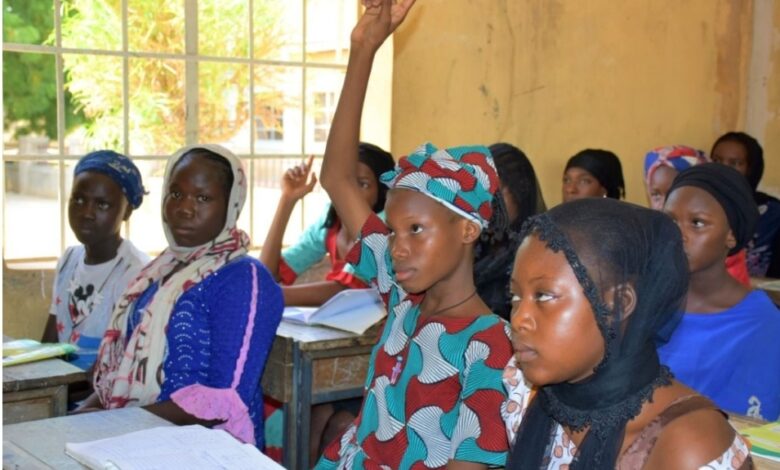Aid Organisations Wrap Up EU-funded Education Program In Northeast Nigeria
The €10 million EU-funded education program enrolled over 13,000 out-of-school children back to classes in northeastern Borno state.

A group of aid organisations in the northeast of Nigeria has rounded up a three-year European Union (EU)-funded education program for at least 13,800 out-of-school children in Borno State, the epicentre of a thirteen-year-old conflict in the region.
The winding down of the programme led by Plan International in partnership with Save the Children and GEPaDc was disclosed on Tuesday, June 14, during a ceremony in Maiduguri, the Borno State capital.
Since its inception in 2019, at least 13,800 out-of-school children have been returned to classes in nine local government areas of the state.
It also assisted the government in developing a national accelerated basic curriculum that will help cut down on the number of out-of-school children in the country.
Jummai Musa, the Director of Programme Quality and Innovation at Plan International, while representing the country Director stated that the program had supported the return and enrolment of “more than 13 000 children to school across Maiduguri Metropolitan Council (MMC), Jere, Monguno, Gwoza, Magumeri, Biu, Mafa, Damboa, Konduga LGAs in Borno State, Northeast Nigeria.”
The official noted that the 12 years of conflict in northeastern Nigeria have affected over 14.8 million people making it one of the worst global humanitarian disasters.
While referencing UNICEF data, the official highlighted that Boko Haram insurgents killed approximately 645 teachers, 19,000 teachers were displaced, and over 1,500 schools were damaged, destroyed, or occupied by armed groups or displaced populations.
An estimated 80,000 primary and secondary school pupils were said to have benefited from improved access to quality education through the €10 million funds provided by the EU for the program.
“More than 13,000 children and youth who had lost some years of learning benefitted from accelerated learning, while 12,000 young people benefitted from life-skills training, and 3,010 received employability & business training,” the official said.
In the area of education infrastructure development, it was disclosed that “182 classrooms were rehabilitated and furniture provided, 82 water points were installed or repaired, and 550 latrine cubicles were constructed across the most needed of the 123 schools and 41 Tsangayas.”
In addition, 52,585 children received vouchers for learning kits, 25,462 girls and young women received dignity kits to manage menstruation, and 2,580 young people received vouchers for business start-up kits.
The three-year program also provided teaching kits and textbooks to 123 schools, out of which 25 were Tsangayas, 73 were primary schools, and 24 were Accelerated Basic Education Programme (ABEP). At the same time, 430 teachers were trained and also received a monthly stipend.
Other interventions included the provision of 14 schools with kitchen gardens and psycho-social resources in 73 schools for referral of children with trauma. In addition to reviewing the School-Based Management Committee (SBMC) policy.
Nziyakwa Malgwi, a 14-year-old displaced girl from Hawul beneficiary, said she had never been to school before her family was displaced from their community some years ago. But now, with the support of the program, she can speak English.
Another beneficiary, Mohammed Fali, a 32 years old man who uses a wheelchair, gave an emotional testimony of how his life was transformed from being a street alms beggar to a self-sufficient entrepreneur.
New curriculum excites state authorities
Abba Yusuf, Permanent Secretary, Ministry of Reconstruction, Rehabilitation and Resettlement (RRR), while representing the State Governor applauded the development of a national accelerated basics curriculum that will help cut down on the number of out-of-school children in Nigeria.
The accelerated curriculum was said to have been developed by the Nigerian Educational Research and Development Council (NERDC) with support from the European Union and Plan International. It was piloted by the EU project in Borno.
The representative appreciated the EU “for funding the project which renovated classrooms, constructed gender-segregated latrines, new boreholes and distributed school bags, water bottles, biros, mathematical sets to 13 800 students.”
EU Team Lead in Borno, Kabiru Abass, advised the state government to grant employment to the volunteer teachers trained by the project.
He says, “This would help to reduce overcrowded classes and return children to school after dropping out.”
Support Our Journalism
There are millions of ordinary people affected by conflict in Africa whose stories are missing in the mainstream media. HumAngle is determined to tell those challenging and under-reported stories, hoping that the people impacted by these conflicts will find the safety and security they deserve.
To ensure that we continue to provide public service coverage, we have a small favour to ask you. We want you to be part of our journalistic endeavour by contributing a token to us.
Your donation will further promote a robust, free, and independent media.
Donate HereStay Closer To The Stories That Matter




